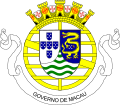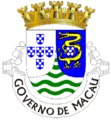Emblem of Macau
This article needs additional citations for verification. (April 2020) |
| Regional Emblem of Macau | |
|---|---|
 | |
| Armiger | Macau |
| Adopted | 1999 |
The Regional Emblem of the Macao Special Administrative Region of the People's Republic of China came into use on 20 December 1999, when the sovereignty of Macau was handed over from the Portuguese Republic to the People's Republic of China. The emblem is now referred to officially as the "Regional Emblem" (區徽).
Description
[edit]The regional emblem features the same design elements as the regional flag of Macau in a circular setting. The outer white ring is shown with the caption of the official name of the territory in traditional Chinese: 中華人民共和國澳門特別行政區 (Macao Special Administrative Region of the People's Republic of China) and the Portuguese short form: "Macau".
History
[edit]The coat of arms used by Portugal followed traditional European styles:
The first coat of arms used in Macau was used until the end of the 19th century. It features the arms of Portugal surrounded by the saying Cidade do nome de Deus, não há outra mais Leal (Portuguese for "City of the Name of God, there is none more Loyal").
In 1935, most Portuguese colonies were given coats of arms that followed a standard design pattern.[3] For Macau, a dragon was used for the part of the shield featuring a design unique to each colony.
The last coat of arms of colonial Macau, used until 1999, shown here in its most simple form, was used in banknotes, coins, stamps, official documents and appears also in the façade of the "Banco Nacional Ultramarino" in Lisbon.
-
First coat of arms
-
Second coat of arms
-
Simple coat of arms (1935–1999)
-
Coat of arms (1935–1951)
-
Coat of arms (1951–1976)
-
Coat of arms (1976–1999)
-
Simplified coat of arms (1976–1999)
See also
[edit]References
[edit]- ^ "Portaria 8098: Aprova as ordenações das armas das colónias que, nos termos da Constituïção e do Acto Colonial, formam o Império Colonial Português", Diário do Govêrno n.º 104/1935, Série I de 1935-05-08, 597–599 (in Portuguese)
- ^ "Portaria 8098", Boletim Oficial n.º 37/1935, 1935 Setembro 14, 1217–1219 (in Portuguese)
- ^ published in the Diário do Govêrno[1] and published in the Official Bulletin of Macau[2]
External links
[edit]- Lei n.º 6/1999 Utilização e Protecção da Bandeira e do Emblema Regionais
- Regulamento Administrativo n.º 5/2019 Disposições concretas relativas à utilização das Bandeiras e Emblemas Nacionais e Regionais e à execução instrumental e vocal do Hino Nacional
- Designs of the colonial coat of arms of Macao in 1934 Reference code(s): MO/AH/AC/SA/01/14775 – Webpage from the Archives of Macau website about several proposed coats of arms for Macau in 1934; none of which were adopted.







